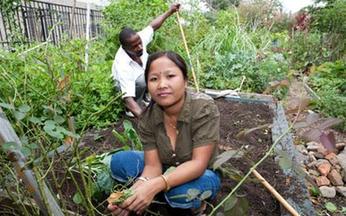
This is the VOA Special English Agriculture Report.
Generations of newcomers have brought their tastes and sometimes their farming skills to American soil. These include refugees who have gotten help from government agencies and private groups to grow crops on community farms. These farms and gardens can be found across the country.
Bantu refugees from Somalia helped start the New Roots Community Farm in San Diego, California. Many of them did not have much money or much fresh produce in their lives. Some, especially young people, were eating unhealthy fast food.
The refugees wanted to grow their own food. Cambodians and other groups in San Diego were in a similar situation.
A community farm seemed like a good answer. The refugees got help from the group that had resettled many of them, the International Rescue Committee. But getting a permit to use some open land owned by the city took about two years.
The New Roots Community Farm opened in 2009. The farm is almost one hectare. People can learn how to grow foods from back home as well as traditional American crops.
The growers sell some of their produce at a marketplace and to restaurants.
One result of the community farm is that people are learning about foods from other people's homelands. First lady Michelle Obama -- who has her own vegetable garden at the White House -- visited the farm in San Diego last year.
A group called the Somali Bantu Zigua Community has operated a farm for several years near Boise, Idaho. Dadiri Nuro is the group's president.
DADIRI NURO: "We are farming people. We like to farm. We need fresh food. We have two kinds of corn. We have African corn, we have American corn. Americans, they like soft corn, and the Bantu, we like hard corn."
Mr Nuru came to the United States in 2004. He and his family had been living in a refugee camp in Kenya.
He says more than 15 crops are grown without pesticides at the farm.
DADIRI NURO: "We have potatoes, we have tomatoes, we have kale, lettuce, cabbage, onion, shallots... "
The community group sells some of its produce at a farmers market and has now bought storage freezers. The group has also donated food to other communities.
The Idaho state Office for Refugees has advice on its website about starting a community garden. You can find a link at voaspecialenglish.com.
And that's the VOA Special English Agriculture Report, written by Jerilyn Watson. Our programs help people learn English. Go to voaspecialenglish.com I'm Bob Doughty.
Ivory Coast refugees settle in for long stay in Liberia
World Refugee Day given urgency by Arab Spring
Malnutrition rates worsen at newest Somali refugee camp
Experts defend way of life for herders in East Africa
(来源:VOA 编辑:Rosy)
